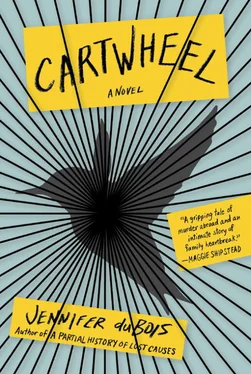The worst was when they ran images of Katy—which they did, at cruelly frequent intervals, nearly as much as they ran pictures of Lily; often, they showed their pictures side by side. Katy’s image filled Sebastien with a sort of mental vertigo every time it appeared; he could not yet make his brain automatically register her as dead. Her deadness simply did not seem intuitive—maybe because the deadness of vague acquaintances felt uncomfortably similar to their aliveness. Sebastien had glimpsed Katy occasionally in real life, and now he glimpsed her occasionally on television; she was still beautiful, still remote, still a person he did not really know. No matter how hard he tried, Sebastien could not make her seem as dead as she actually was, and always would be. He badly wished he could do this; not managing it seemed disrespectful, somehow. And each time Katy’s image appeared, before Sebastien fully remembered what had happened, he experienced a momentary anxious feeling—fractional, subconscious, pre-lingual—that she was a person he had been charged with protecting and had somehow forgotten.
And those moments forced Sebastien to consider a question he’d been trying hard to avoid: Why, he wondered, had he not been arrested along with Lily? Sebastien went back to that day again and again. Already his memory was shrinking from looking at it straight; the day was saturated in a blinding, otherworldly light, beginning with the moment he saw Lily come running across the lawn. Sebastien hadn’t known yet what was happening, and for an instant he’d thought she was coming back to apologize—he’d imagined she was weeping with the fear that she’d created irrevocable damage between them; he’d hoped she was finally revealing that, like him, she’d had a frangible and hidden heart all along. Was there a moment, when she buried her head in his shoulder and sobbed, when Sebastien was glad she’d been returned to him this way—glad that she’d been returned to him any way at all? There was not. But Sebastien had also congratulated himself momentarily, retroactively, for this virtue—and that, he knew, was just as bad or worse.
If they were handing out prison terms for murky moral impulses, Sebastien figured, he might as well go ahead and turn himself in.
Every day, Sebastien watched for developments at the Carrizos’. They’d been summoned back suddenly from their trip (to witness the baptism of some northern nephew, according to the women at Pan y Vino and the news), and at first Sebastien thought they were staying sequestered in the house, though he did not see them. Teenagers drove by at night honking and yelling, but Carlos never emerged to shoo them away. The car was sometimes there and sometimes not; its comings and goings, along with the illuminations and cessations of the lights in the house, seemed to reject all logic. But this, in a way, made sense to Sebastien. Normalcy and sanity had been suspended, after all. Katy was dead. Lily was in jail. The Carrizos’ car, unsurprisingly, was no longer adhering to a regular schedule.
It took Sebastien a week to understand that the Carrizos weren’t living in the house anymore. He’d been staring dumbly out the window, wearing his overly warm smoking jacket, at two in the afternoon, and he actually slapped himself on the forehead when he realized it. The Carrizos weren’t living there anymore. Of course they weren’t. Who could stand to live there anymore? The house was haunted, it was horrifying. And, no less important, it was a crime scene. The Carrizos weren’t living there anymore. They were just coming and going to pick up their things.
It took Sebastien nearly another day to fully register that this meant he’d been living all alone on the hill—all alone truly, for the first time in his life—ever since Katy had been killed.
And still—out of the force of habit, or the force of something else—Sebastien kept watching the Carrizos’ house, feeling a strange revulsion every time he glanced across the yard. The sun was the wrong intensity these days, always too weak or too brutal. The grass was the wrong color, too—it had begun to turn a rusty red, the symbolism of which Sebastien noted with no small amount of superstitious horror before realizing it just meant the Carrizos had stopped watering the lawn. In the late afternoons the house cast long shadows that didn’t just move toward the street—they seemed to creep , Sebastien couldn’t help but feel, with sneakiness and intentionality. The days were beginning to last forever. In the hideous and unrelenting evening light, Sebastien drew sheets around the windows.
He forgot to be afraid of the killer, though he knew that he should be. Believing that Lily had not killed Katy—and this he believed utterly—had somehow made it difficult to fully believe that Katy had been killed at all. But indeed she had been, and Sebastien tried to imagine the person who had done it. He summoned an image of a man—lurking around, staking out both houses, perhaps, maybe entering the Carrizos’ by accident; after all, there was far more to steal at Sebastien’s. Maybe the murderer had killed Katy by mistake. Maybe it was Sebastien he should have killed, if he was going to absolutely insist on killing someone. Or maybe the killer had been looking for Lily—perhaps he’d known her from that awful club where she worked, where boys with popped collars and Euro-lascivious hair went to preen and overpay for cocktails. Perhaps he was one of those, or perhaps he was not one of those and wanted to be. Or maybe it really had been Katy the killer was after, for reasons that Sebastien did not expect ever to fathom. Each theory was disturbing in a different way, though they shared one disturbing element: that the killer, whatever his plan, had seemed to know that Sebastien presented no threat. The killer had somehow surmised, correctly, that Sebastien was not a person to worry about—that he’d probably be too cowardly to do anything should he hear the screams, and that he’d probably be too stoned and inert (and blasting Air, as it happened) to even hear them in the first place.
And so, out of respect, Sebastien tried to be afraid. He should be thinking about moving, he knew. He should, at the very least, be thinking about putting real locks on the doors. But he wasn’t afraid, not really. When his parents died, he’d been afraid—and not merely afraid, but deeply paranoid in a way that felt final, and somehow true. This feeling had reached its apex two days after the crash, the day of Sebastien’s own flight back to Argentina, when he’d been completely convinced that whoever had killed his parents had followed him right through the post-9/11 security performance art and into Logan International Airport to finish the job; every single person Sebastien saw that day seemed to him to have been cast in his own story—a story that had always been straining, it turned out, toward this single, terrible ending, all along. Sebastien tried to invoke some of that fear now, sitting alone on the hill. But he could not. He did not feel afraid, exactly. Instead, what he felt was a surreal, disowned dread; he kept having dreams where he’d remember with a sickening feeling that he’d been entrusted with the care of something—once an infant, once a puppy, once a small furry invented creature that looked a bit like a guinea pig—and had forgotten it for far too long, and went hurrying back, frantic, knowing it was already too late. A fear so abstract and metaphysical could drive a person crazy, Sebastien saw. And after a while, he began to feel that it might be an odd sort of relief to have an actual murderer show up—so dissolute was his anxiety, so vast was his longing for a horror he could actually see.
The 911 call itself was finally produced, as Sebastien had known it eventually would be. He had not been there when Lily made it—he’d been sprinting across the lawn to be ready to direct the police to the basement—but this became hard for Sebastien to remember as he listened to the recording, over and over and over again, along with the rest of the world. On television, the tape opened up new landscapes of syntactical and tonal speculation, previously unplumbed depths of slander, entire undiscovered universes of improvisation; the news channels reacted to its emergence with unrestrained—and, Sebastien felt, unseemly—glee. At one point, Sebastien happened across a show where a “vocal analyst” was offering his expert opinion on what Lily’s speech patterns revealed about her psychological makeup—even though Sebastien felt that the vocal analyst, in addition to being a charlatan, was possessed of a very unrepresentative sample of Lily’s voice: On the 911 tape, she simply did not sound like herself. (Sebastien was not entirely convinced that it was Lily’s voice at all, in fact, and he had half an idea to call up the vocal analyst—maybe the next time he did a call-in show, maybe at home in the middle of the night—and tell him this.) Instead of sounding breathless, as she often did, the Lily on the tape sounded somehow the opposite; she sounded as though she had only breath and could not remember what she was supposed to do with it, or what it had ever been for.
Читать дальше












